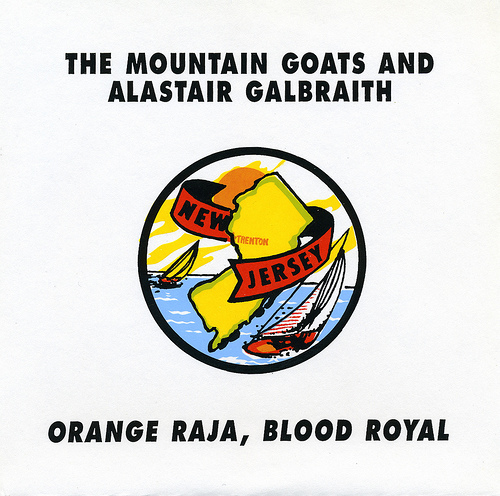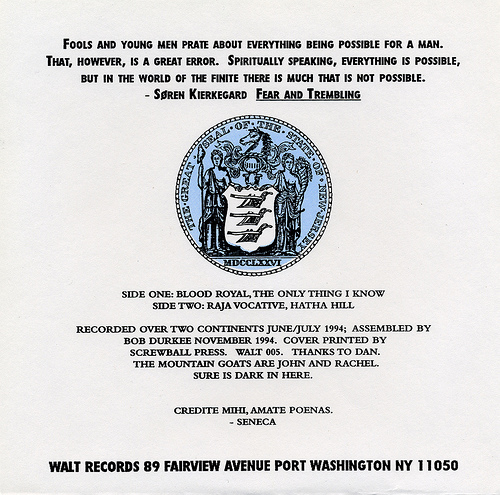Orange Raja, Blood Royal 1 2 3


Released: 1995
Label: Walt
Liner notes
Fools and young men prate about everything being possible for a man. That, however, is a great error. Spiritually speaking, everything is possible, but in the world of the finite there is much that is not possible.
— Søren Kierkegaard, Fear and Trembling 4
Thanks to Dan. The Mountain Goats are John and Rachel. Sure is dark in here.
Credite mihi, amate poenas.
— Seneca 5
Related material
Orange Raja, Blood Royal was included in its entirety on the compilation Ghana.
Table of contents
Blood Royal
I remembered you
I remembered where you'd come from
I remembered you
I remembered where you'd gone
And in the shifting neon air
I saw the colors of the revolution everywhere
Blood royal
I remembered you
I remembered all the little things you said
I remembered the shape of your face
I let the thought go to my head
And in the iron blue dawn
I felt power coming on
Blood royal
The Only Thing I Know
When you came back from Trenton 6
All the sparkle was gone
You stood in the shadow
And the curtains were drawn
And I know you're lying
And you know you're lying too
That is just about
The only thing I know about you
When you pocketed your eyeshadow
And you picked up the phone
Stepped on the balcony
And drank in the drone
And I know you're leaving
You know you're leaving too
That is just about
The only thing I know about you
When you stopped on the sidewalk
And you looked up above you
The warm, wet air came down the shelter
How much do I love you
Well, you know you're dying
And I know you're dying too
That is just about
The only thing I know about you
Raja Vocative 7 3 8
A bird you would have liked brought the sky down
But it was useless to see it without you around
And in the unstoppable camera of my mind's eye
I saw you and some foreign guy
And I could hear your voice ringing
I could hear you singing
From all away across the country in Palm Springs 9
I could hear you now
Your laughter tore through the New Jersey night
And I can't stand it, but I'm all right
Stood out on the balcony and I took a look around
And a bird we would have loved the sight of brought the sky down
And I could hear your voice ringing
I could hear you singing
From all away across the country in Palm Springs
I could hear you now
Hatha Hill 10
As the sun went away
It was sending out signals
You had sugar on your stomach
You had sugar on your hair
You had sugar underneath your eyes
You had sugar on your mouth
I know that trick too
I know what it means coming from you
Further reading
- Orange Raja, Blood Royal, Nall, accessed August 10, 2014.
Credits
Thanks as always to Caliclimber, whose wonderful Flickr page provided the album art.
Footnotes
-
"I had these songs I'd written after seeing Chicago for the first time, and experiencing humidity the likes of which we never have back in Southern California. I transferred them to quarter-inch reels and sent them down to New Zealand. A couple weeks later the phone rings at 4:30 in the morning. It's Alastair Galbraith. He holds the phone up to his four-track reel-to-reel and plays me the first of these four songs. Hands-down one of the best moments I've ever had, listening to what Alastair had done, lying on my bedroom floor in the dark with the phone pressed up to me ear. The violin wailed through the earpiece like a newborn infant." — Ghana liner notes ↩
-
Orange Raja, Blood Royal is a collaboration EP with Alastair Galbraith, who went on to collaborate with the Mountain Goats in other endeavors as well. In an interview, he described the collaboration as follows:
On the 1993 tour of the States, Peter and I played a gig at Pomona just outside of Los Angeles at a venue called The Haven, and our support act for the evening was The Mountain Goats. John Darnielle at that point, as he does now, played acoustic guitar and sang, and that time he had the 'Bright Mountain Choir' backing him up, two women that sat on either side of him in chairs and swayed from side-to-side and sang a bit of back-up harmony. His intensity was awe-inspiring, and he lived the songs as he sang them. His lyrics were so beautiful, and the fact that he was really feeling what he was communicating struck me very powerfully and by the time he had finished I'd written him a kind of fan letter at the table I was sitting at, saying that I had never seen anything like this, and that he was a great songwriter and a brilliant performer and that it was hard to go on after him. Later that evening he and I and Dennis Callacci and Alan Callacci [sic] sat around at Dennis's house and passed around an acoustic guitar and played each other lots of songs. John wrote to me after I got back to New Zealand and asked if I would be interested in putting violin onto some songs. I ended up thinking I wanted to put more than just violin on, so I ended up using old, fake, third-world-shop tabla and a little bit of mouth organ which I had never played before, and a few violin tracks and sang, or repeated, some of his lines, although he'd asked me not to (laughs). But he ended up liking that.
John has also commented very positively about the collaboration:
John: ... the collaborative thing is when you meet up with somebody and you get along well enough to see what each other are doing that you think, "well, the natural thing to do is to do something together." That's what happened with me and Alastair. And that's ideal.
Matt Houser: How did you meet Alastair?
J: We played a show together at The Haven near Pomona. I enjoyed what he did and he enjoyed what I did. I mentioned to him before he left the possibility of doing something and he said, sure, send me stuff. And I did.
M: And he just added his tracks?
J: He wrote me a letter and we really hit it off spectacularly that night. It was amazing. And those songs [from the Orange Raja, Blood Royal 7"] were written at a very particular time he knew a lot of details about – that he correctly heard where they were coming from and really hooked into it. He's great.
First interview potentially printed originally in Ptolemaic Terrascope #23 (July 1997), but it's unclear, as their online archive includes much of this interview, but not this particular question. Sourced from Alasdair Galbraith, reprinted online by Emperor Jones, retrieved August 20, 2014.
Houser, Matt (1998). John Darnielle of the Mountain Goats. Science Geek #4. Retrieved August 21, 2014. ↩
-
A raja is a Sanskrit word for a monarch, used throughout the Indian subcontinent. ↩ ↩2
-
Søren Kierkegaard was a pivotal 19th century Danish philosopher and widely considered to be the first existentialist. His work focused largely on Christian ethics, alienation, the subjectivity of meaning, establishing the self, and other existential themes. In particular, Fear and Trembling, a title drawn from the Psalms, discusses the importance of resignation to one's fate as a key step in faith, allowing one to truly be hopeful and free. To make this point, he draws on the Biblical story of Abraham, who is called on by God to sacrifice his only son, Isaac.
The quoted phrase is derived from a paragraph in which Kierkegaard is exploring what he calls the "knight of faith", a person whose faith in God and himself allows them freedom of choice. Particularly, he is arguing that letting go of attachment to some possibilities allows him a greater and more profound spiritual experience.
Kierkegaard, Søren (2006). Fear and Trembling. Evans, Stephen, and Walsh, Sylvia, editors. Cambridge: Cambridge University Press. ISBN 978-0-521-61269-2 ↩
-
An incomplete quote from Seneca the Younger's tragedy Thyestes, written in the first century CE. This play tells the story of Thyestes, who with his brother Atreus murder Chrysippus, their half-brother, to secure the throne of Olympia. Their father, Pelops, exiles them, and they ultimately become rulers of Mycenae, leaving many deaths and betrayals behind them.
This quote is spoken in the beginning of the play by the Ghost of Tantalus, who is speaking with one of the Furies, as he refuses the Fury's call to torment other prisoners. Tantalus is a Greek mythological figure famous for his eternal punishment in Tartarus, the prison of the Titans, where he is forced to stand in a pool of water underneath an abundant fruit tree, but starves and thirsts as the pool and fruit always pull away from his reach. More fully, Tantalus' Ghost says (quote underlined):
Quicumque poenas lege fatorum datas
pati iuberis, quisquis exeso iaces
pavidus sub antro iamque venturi times
montis ruinam, quisquis avidorum feros
rictus leonum et dira Furiarum agmina
implicitus horres, quisquis immissas faces
semiustus abigis, Tantali vocem excipe
properantis ad vos: credite experto mihi,
amate poenas. quando continget mihi
effugere superos?Translated, this reads:
Whoe'er thou art, by the fates' law bidden to suffer allotted punishment; whoe'er liest quaking beneath the hollowed rock, and fearest the downfall of the mountainous mass even now coming on thee; whoe'er shudderest at the fierce gaping of greedy lions, and, entagled in their toils, dost shudder at the dread ranks of furies; whoe'er, half burned, shunnest their threatening torches, hear ye the words of Tantalus now hasting to you: believe me who know, and love your punishments. Oh, when shall it fall to me to escape the upper world?
Seneca the Younger (1917). Tragedies. Miller, Frank Justus, translator. Archived by the Internet Archive, retrieved August 20, 2014. ↩
-
Trenton is the name of multiple cities, but given the album cover, it most likely refers to Trenton, the capital city of New Jersey, located near New York City and considered to be part of the New York metropolitan area. ↩
-
"If you want to know a secret about this song I will tell you one. It is a heavily-coded response to some personal pain I was going through when I wrote it. There is maybe one person alive who would be able to do the decoding necessary to get at the truth of the matter, and she isn't talking."
Moeller, Sean (2008). A Constant Reminder That People Burn And So Does Time, Daytrotter session interview, May 26. Archived by the Internet Archive, retrieved August 21, 2014.
"This is a song written by a much younger man than me who had the same social security number. It's a love song." — Bottom of the Hill, San Francisco, March 2, 2008 ↩
-
Vocative has two meanings: it is a type of grammatical case found in Latin, Sanskrit, classical Greek, and some Slavic languages; it also describes something that refers to a vocation or profession. The vocative case is used for nouns that address a person. ↩
-
Palm Springs is a city located in the Coachella Valley of the Southern California desert, populated with resorts and tourists. ↩
-
Hatha is a Sanskrit word meaning force or violence. It is commonly associated with hatha yoga, a set of physical practices originating with Hinduism intended to promote spiritual strength. In the 20th century, hatha yoga practices spread in the Western world as a form of exercise.
I'm not aware of any specific location called Hatha Hill, but if you know differently, please let me know. ↩